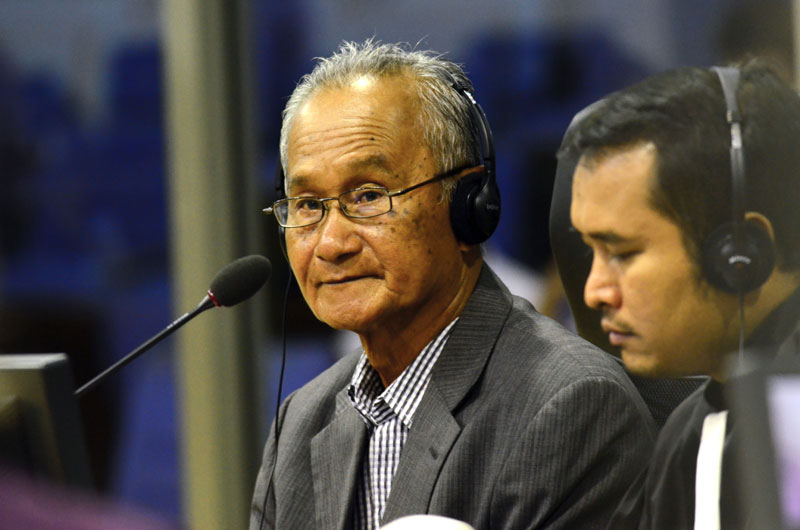A witness at the Khmer Rouge tribunal on Thursday insisted that he was not involved in directing the “smashing” of perceived enemies while he was a commune chief in Takeo province’s Tram Kak district during the Pol Pot regime.
Nut Nouv, who became Sre Ronong commune chief in 1978, admitted attending meetings with sector chief Ta Saom where potential targets for purging were discussed, but denied having any decision-making role.

“On the issue of decision-making process for the purges…the commune did not have a role to play. Only the sector or the zone had the authority for the arrests and smashing,” said Mr. Nouv, a witness in the second phase of the trial of Khmer Rouge leaders Nuon Chea and Khieu Samphan.
Mr. Nouv said he was also not required to make any arrests because the work had already been done by his predecessor.
“When I went to Sre Ronong commune, the previous commune chief had already conducted the purge so when I was there I didn’t make arrests of anyone,” he said.
The witness said that if people tried to flee the country, he would submit a report to the district, but if anyone complained about the harsh working conditions he would keep it from his superiors.
“In my commune, for those who complained about working conditions there would be a session of criticism and self-criticism so that those people could understand about collective interests. I never sent any reports to the district,” he said.
Mr. Nouv also claimed that evacuees from Phnom Penh who served under the preceding Khmer Republic were spared if they admitted to being part of the previous regime, but would “never return” once arrested if they opposed the “general principles” of the communist party.
The day’s proceedings began with the final testimony of Neang Ouch, alias “Ta San”—a brother-in-law of Ta Mok and alleged ex-chief of Tram Kak—who finished his 3 1/2 days of questioning by complaining of the toll his trip to Phnom Penh had taken on his crops in Pailin province.
“I had to leave my durian plantation behind. Nobody took care of my durian plantation and I was informed by telephone that 15 of the overall durian trees had been destroyed, as the small plants died,” Mr. Ouch said.
The hearing ended after Victor Koppe, a lawyer for Nuon Chea, explained why he had requested a visit to Kraing Ta Chan. He said seeing the former prison site would help create a better understanding of the site’s layout for all parties.
“The comparison may be a little strange, but you wouldn’t buy a house based on a map of the house and some photos. You’d like to actually see it, and once you see something, especially this crime site, it’s extremely helpful in understanding all kinds of issues,” he said.
He added that it would be “physically impossible” for 15,000 corpses —the estimated number of deaths at the center—to be buried at the site.
Marie Guiraud, international civil party lead co-lawyer, said the trip would be “completely irrelevant” as the original buildings are no longer standing.
Hearings continue on Monday.



